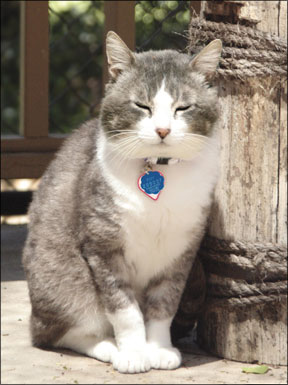Dear Elizabeth: My vet tells me that my indoor-only cat, Izzy, needs to be vaccinated for rabies. We live in an apartment in New York City and Izzy is never outside, so why does she need a rabies vaccine? The simplest answer is that rabies vaccines are required by law for all cats and dogs over the age of six months in New York state – and many other states have similar requirements. But thats probably not a very satisfying answer. Despite my early years running free on the farm, I now reside solely indoors, and I too have wondered why I need to be bothered with rabies vaccines. Ill share what Ive learned from my friends at the Feline Health Center. Most importantly, rabies is a fatal disease for people or any animal unlucky enough to be exposed through a bite or scratch to the saliva of a rabid animal, so extra precautions must be taken to protect us all. Rabid animals dont behave like normal animals – sometimes theyre overly friendly or abnormally aggressive. Weve heard stories about rabid raccoons breaking through screens and coming indoors, and its quite common for bats, which have a high incidence of rabies, to find their way indoors. Theres nothing that I like better than chasing a bird or bat around the house, and Ill bet that most of my feline brethren would agree. Bats can enter 288 homes or apartments through small cracks. Theres also always the chance, however small, that an indoor-only cat might sneak outdoors through an open window or door. Some of us become frightened and escape when were carried outdoors for, say, trips to the vet hospital, and Ive heard about cats whose cars have been involved in accidents that left them suddenly free (cat carriers will prevent most of these accidental escapes). If I were unvaccinated or even overdue for my rabies booster (depending on how overdue I was) and came in contact with a rabid bat or other animal, the consequences could be quite severe. Each state has its own laws, and under the strictest laws, euthanasia might be recommended! If my owners didnt agree to this, then a strict, six-month quarantine would be required, usually at a veterinary hospital – which can get very expensive. While there is an expensive preventative series of shots that humans can receive to prevent disease after exposure to a rabid animal, no similar preventative protection exists for unvaccinated animals. However, if I were up-to-date on my rabies vaccination and then exposed to a rabid animal, I would simply get a rabies booster and a 10- to 45-day quarantine at home. Similar consequences might occur if I were to bite someone. Even though we may be calm and loving at home, many cats (not me!) become frightened at the vet hospital and sometimes bite unexpectedly. Sometimes we bite children who frighten or hurt us, and sometimes we bite while playing. Bite wounds treated by a physician are typically reported to the health department, which may then request proof of rabies vaccination. If the owner cant provide this proof, once again there may be repercussions for both owner and kitty, including a fine for having an unvaccinated animal; a recommendation that the cat be euthanized and tested for rabies, especially if the cat was ill; or a period of quarantine, for the cat. These penalties may seem overly severe, but remember that once the signs appear, there is no effective treatment for rabies. While the number of people dying from rabies in the United States is small (on average, one or two people per year die of rabies in this country), the number of fatalities is much higher in countries without strong vaccination and post-exposure programs. About 50,000 people die worldwide from rabies each year. For all of the above reasons, Im happy to put up with the inconvenience and bother of getting my rabies vaccine. The risks of skipping rabies vaccinations are just too great!



